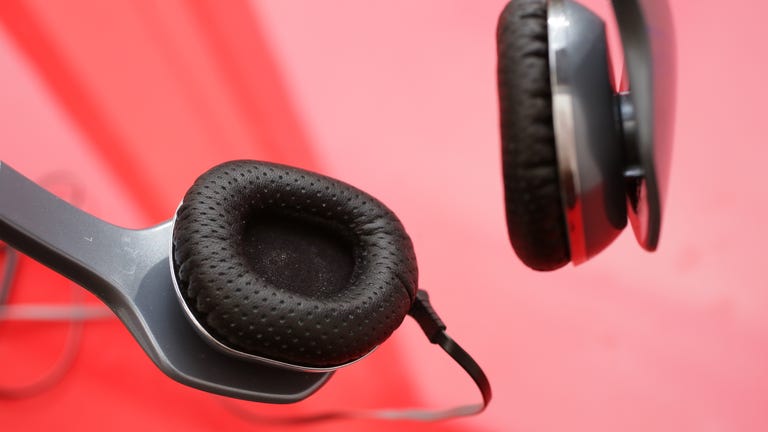 Why You Can Trust CNET
Why You Can Trust CNET MEElectronics Atlas review: Striking looks and decent sound
The MEElectronics Atlas offer distinctive looks, a full suite of features, and sound quality that can't be faulted for the price.
In the days when Dr. Dre was "just" a producer and not yet an electronics design billionaire, headphones looked pretty ordinary. They were usually black -- or in Apple's case, white -- and were more practical than flashy. With the coming of Beats, headphones became must-have fashion accessories, and the rest of the industry had to run to catch up.
The Good
The Bad
The Bottom Line
The MEElectronics may not look like Beats -- they are too angular, and dare I say it, even gaudier -- but they follow the same "headphones as design aesthetic" blueprint. But there are also some well thought-out features in here: a universal volume control, foldable earcups, and a tangle-resistant, detachable cord.
Sound quality is pretty good for the price, with the bass-rich response that's expected of street-style headphones. On the other hand, they lack the noise isolation of other closed cans.
Given my regular commute on a noisy subway and the headphones' polarizing looks, I found myself overlooking the Atlas in favor of a model with better noise isolation. If you don't need to block out sound as much when on the move, however, and the looks appeal, then these well-made, well-featured, and better-than-average sounding headphones are worth a listen.
Design and features
If you're after a discreet set of earphones, you can probably tell already that the MEElectronics are not for you. The earcups and band use a process called IML (In-mold labeling) which involves printing designs between layers of plastic, which is supposed to make them hard-wearing. The designs themselves in this case are quite striking, though a little too ostentatious for my taste. I received the Orion models, which have a "Tron"-like motif. However, if you're an LA resident, you may want to go for the Sky model with its coastline of California.
The earcups fold inward, making them easy to store, and they come with a small bag with a drawstring for convenient transport. The headphones feature 40mm drivers and a closed design with breathable earpads. However, compared to competing models, it doesn't offer as much isolation, particularly on public transport.
The cans feature a flat, detachable cable that I found to be relatively tangle-free. As these are designed to be used with a smartphone, there is an inline mic in addition to a Stop/Play/Talk button and a volume slider. Unlike most headphones that have an electronic volume control -- which usually work only with iOS devices -- the Atlas has a physical slider switch that should work with everything.
Performance
If you're used to the "boom-tish" of Beats headphones, then the Atlas can sound a little lacking in the thrills department. They have a warm response that can lean toward muddy depending on the source, yet there is plenty of treble on tap. In the vocal register, the Atlas exhibit a slight sibilance boost, seemingly to increase the intimacy of vocals, but this doesn't affect listenability or comfort. I found you could wear the Atlas for a long time with little fatigue.
System of a Down's "Toxicity" really showed the headphones at their best, with plenty of bite from the guitars and the acid spit of Serj Tankian's vocal delivery. If you tend toward gentler styles, the overly prominent bottom-end and recessed midrange might rob vocals and acoustic instruments of their presence. Surprisingly though, the headphones sounded more natural with Jethro Tull's "Thick As A Brick" than my favorite street-style headphones, the Marshall Major FX 50 , and with less vocal harshness. But bass-heavy music is mostly where these phones are at.
Detail and air are very rare commodities at this price, and almost nonexistent in closed models. The Atlas' soundstage is a lot more enclosed than the equivalently priced Grado SR60i , but bass response is also more fully formed. The Grados have a very natural, unforced sound that the Atlas lacks, but this is possibly down to the differences in construction between the two (closed vs. open). While the Atlas are fine when on-the-go, they can sound a little staid and conservative for use at home or work.
Conclusion
Though they have an MSRP of $99 (£75 in the UK), the MEElectronics Atlas can be found online for nearly half that, and for this they're pretty compelling. While the cosmetics are a matter of taste, the MEElectronics Atlas are a well-built headphone with a good many features for the money. Given its emphasis on style, sound quality is pretty good but "nerdier" hi-fi models like the Sony MDR-7506 and the Grado SR-60 easily beat the Atlas for bass agility and overall naturalness. In the case of the Atlas, style has won over substance, but it was a pretty close race.


